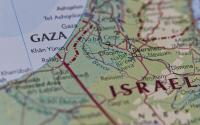by Ali Abunimah; Electronic Intifada; October 03, 2002
The irony of Israel's position between Iraq and the United States, is that the more Israel wants the US to attack Iraq, the quieter Israel will have to stay about it and the lower the profile it will have to keep. The paradox was most clear right after the September 11 attacks when Sharon was the first to volunteer to join the "war on terrorism," only to find himself coldly rebuffed by the Bush administration. Israel soon learned that sometimes discretion is the better than an open alliance, and by working on the US administration behind the scenes, Israel's lobby was able to convince the Americans that it would be hypocritical to condemn Israel's "war on terrorism" while conducting its own.Much of the storm of criticism that Israeli prime minister Ariel Sharon has faced for reimposing a siege on Yasser Arafat's compound in Ramallah has come from Israelis who would dearly like to see a U.S. war against Iraq, as Sharon certainly would. Leading the pack is Israel's foreign minister, Shimon Peres, whose pretensions of being a "dove" and international statesmen have worn out even in the European chanceries that once fawned over him during the Good Old Days of Oslo. According to Ha’aretz, "Peres criticized the IDF operation in Ramallah saying that it harmed the cause of reform in the Palestinian Authority and that it focused attention in the wrong place. According to the foreign minister, the main issue currently at hand is the planned U.S. attack on Iraq, and that Israel should not do anything to frustrate this plan." ("Peres blasts gov't policies, says PM has no clear objective," Ha’aretz, 29 September 2002)If Iraq's alleged weapons of mass destruction programs represent an immediate threat to Israel and other countries in the region, as US and British officials have been constantly asserting, one might expect to see more caution in Israel, which unable to suppress the uprising against its military occupation ought to be more sanguine about the prospect of yet another war front opening up. But over the past years, Israeli military assessments have consistently concluded that Iraq represents no real military threat to Israel at the present time, and certainly Iraq would not launch an unprovoked aggression against it.Still, there is always the chance that if the United States invades Iraq, that country might try to lob a few of its remaining missiles at Israel, as it did in 1991. Citing foreign sources, the Israeli press this week reported that Israeli special forces are already operating in Iraq, searching for Scud launchers which are believed to exist in small numbers, and probably in poor shape.Overall, therefore, it seems Israel views any possible threat from Iraq as a manageable risk, easily outweighed by the benefits of a US attack on that country. Indeed, it is one of the few things for which many Israelis are prepared to tolerate a temporary pause in the "complicating" persecution of the Palestinian people and what's left of their leadership.What could Israel hope to gain from such a war? First, Israel has for decades viewed Iraq, with its highly educated population and enormous natural wealth, as a potential military rival in the Middle East. Therefore anything that sets back Iraqi development is to be welcomed.Second, this Israeli government, like many of its predecessors, views bad relations between the Arab world and the United States as, by definition, good for Israel. Since it is certain that an American war against Iraq would considerably increase the already deep alienation between Arab and American societies, such a war is, in their minds, good for Israel.Thirdly, among a significant and growing minority of Israelis, the idea of "transfer"-- the ethnic cleansing of all Palestinians from Israel and/or the Occupied Territories--is gaining ground (see "The Growing Clamor for Ethnic Cleansing, Electronic Intifada, 28 August 2002). This gives rise to the legitimate fear that some in Israel's military leadership and government might see a war with Iraq, especially if it produces an Iraqi attack on Israel, as a golden opportunity to push a few hundred thousand Palestinians into neighboring countries.For some of Israel's supporters both within the US administration and the think tanks that feed it ideas, catastrophic developments even short of ethnic cleansing and the instability, chaos and violence that would ensue fit into a broader plan to completely remake an unruly Middle East with Israel as the dominant local power, under overall US hegemony.The most comprehensive vision is that of neoconservative godfather Norman Podhoretz, who writes in the September 2002 issue of his journal Commentary that "changes in regime are the sine qua non throughout the region." The regimes "that richly deserve to be overthrown and replaced," Podhoretz affirms,
"are not confined to the three singled-out members of the axis of evil. At a minimum, the axis should extend to Syria and Lebanon and Libya, as well as "friends" of America like the Saudi royal family and Egypt's Hosni Mubarak, along with the Palestinian Authority, whether headed by Arafat or one of his henchmen."Podhoretz makes it clear that it is the United States that should do the overthrowing and replacing.Not content with merely changing nearly every government in the region by force, Podhoretz also hopes to bring about through this scheme "the long-overdue internal reform and modernization of Islam." In other words, what Podhoretz wants is truly a war of civilizations. For Islam to be purged of the elements to which neoconservatives like him object, the increased hatred and fanaticism and possibly September-11-style terror that the Iraq war might provoke some to commit are not undesirable side effects but the necessary pretext for aggressive American intervention which will succeed, "provided that the United States has the will to fight World War IV, 'the war against militant Islam" to a successful conclusion, and provided too, that we then have the stomach to impose a new political culture on the defeated parties."It is amazing that anyone would publish such ideas, and while there is no evidence that in this form they have caught on very far, there is evidence that ideas at least as dangerous have been brought from the cold of Washington's neoconservative think tanks into the heart of the Bush administration and are now directly informing US policy.Several recent articles have highlighted this phenomenon. Writing in The Nation, Jason Vest documented the growing influence of two once marginal groups, the Jewish Institute for National Security Affairs (JINSA) and the Center for Security Policy (CSP). According to Vest, "dozens of their members have ascended to powerful government posts," in the present US Administration, where,
"Industrious and persistent, they've managed to weave a number of issues--support for national missile defense, opposition to arms control treaties, championing of wasteful weapons systems, arms aid to Turkey and American unilateralism in general--into a hard line, with support for the Israeli right at its core." For this group, Vest states, "total war," and "'regime change' by any means necessary in Iraq, Iran, Syria, Saudi Arabia and the Palestinian Authority is an urgent imperative." (The Men From JINSA and CSP, The Nation, 2 September 2002)Among the prominent former advisors and board members of JINSA are current Bush Administration officials Vice President Dick Cheney, Under Secretary of State for Arms Control John Bolton and Douglas Feith, currently the third-highest ranking official in the Pentagon. Richard Perle, chairman of the Pentagon's Defense Policy Board is according to Vest currently a JINSA/CSP advisor.The Guardian's Brian Whitaker recently shed light on a 1996 paper entitled "A clean break: a new strategy for securing the realm," written to advise then incoming Israeli prime minister Benjamin Netanyahu. Whitaker traces to this paper the roots of the "skittles theory" of the Middle East -- that one blow aimed at Iraq can knock down several regimes. The lead author of the paper, published by an Israeli think tank called the Institute for Advanced Strategic and Political Studies, was Richard Perle and another author was Douglas Feith. (Playing skittles with Saddam, The Guardian, 3 September 2002).In addition to bringing about “regime change” in Iraq, Saudi Arabia, and Egypt, Ha'aretz's Akiva Eldar summarizes the other part of the plan like this: "Palestine is Israel, Jordan is Palestine, and Iraq is the Hashemite Kingdom." It is from these circles that fantastic plots to re-install the Hashemite monarchy in Iraq have recently emerged -- this fits in nicely with the Israeli right's long-held belief that the true Palestinian state is Jordan.Eldar points out how the document's writers proposed that Netanyahu press for cooperation with the United States on anti-ballistic missile defense, because "it would broaden Israel's base of support among many in the United States Congress who may know little about Israel, but care very much about missile defense." (Perles of wisdom for the Feithful, Ha’aretz, 1 October 2002)This was perhaps the beginning of what has become a fruitful alliance between those, like the JINSA crowd whose main motivation is fanatical support for an expansionist Israel, and those, of whom Cheney and Rumsfeld are the embodiment, who have no emotional or ideological attachment to Israel, but who see Israel as a useful example or tool to achieve their aim of forcefully extending and asserting US power and sovereignty in pursuit of a narrowly and unilaterally defined national interest. By working to seamlessly merge Israeli interests with those of American power, the pro-Israeli neoconservatives have helped shape a Republican Administration unlike any other, and unlike even the first Bush Administration, which was far less inclined to let Israel alone set the terms for its dealings with the Palestinians and the Arab states.If the threatened war against Iraq, the US decision to de-recognize Yasser Arafat, and the Washington whispering campaign against Saudi Arabia represent the beginning of the implementation of a frightening blueprint for the Middle East, the international community, and particularly the Arab states, need to understand that playing along with American plans in Iraq and hoping to get by will not save them or spare millions of their people untold suffering.
http://www.zmag.org/content/print_article.cfm?itemID=2414§ionID=15






